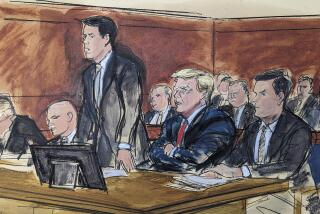1st Step Taken to Prosecute Teamster Chief
- Share via
WASHINGTON — Federal prosecutors in Cleveland have sent a long-delayed “prosecution memorandum” to the Justice Department formally recommending that Teamsters Union President Jackie Presser be charged with defrauding his hometown local union, The Times has learned.
Sources familiar with the case said that the 100-page memo had been delayed for months while the Justice Department repeatedly questioned elements of the inquiry, including the role of a Presser associate.
Officials in Cleveland had said as early as last June that they would recommend that an indictment of Presser be sought, but the transmittal of the memo this week is the first formal government action against the powerful union leader.
The document, the sources said, is based on a three-year investigation of allegations that Presser had fraudulently approved payment of more than $250,000 from his Cleveland local’s treasury to “ghost employees”--persons who performed no work for the union. The payments allegedly occurred before he was elected to head the 1.9-million-member union in 1983.
Justice Department officials are understood to have told the Cleveland strike force, which consists of prosecutors and Labor Department investigators, that a decision on prosecuting Presser and two associates will be made by March.
Presser Associates
The associates are Harold Friedman, a Teamsters international vice president, and Tony Hughes, one of the alleged ghost employees, according to the sources, who spoke on condition that they not be identified.
Justice Department spokesman Thomas P. DeCair refused to comment Friday. Presser’s attorney, John R. Climaco of Cleveland, and Michael Climaco, representing Hughes, did not return phone messages.
Robert J. Rotatori, Friedman’s lawyer, said Friday: “If the Justice Department adopts the charges in the prosecution memorandum, I am convinced Mr. Friedman will be exonerated at trial.”
Political Problem
The Presser case could present a ticklish political problem for President Reagan’s top appointees at the Justice Department because Presser has been Reagan’s chief supporter in organized labor. Last month, Presser was co-chairman of the labor committee for Reagan’s second inauguration.
But White House and Justice Department officials have given no sign that they are concerned about the Administration’s close ties to Presser.
Vice President George Bush, for example, went to Teamsters headquarters here on Jan. 16 to attend the union’s general executive board meeting and thank its leaders for supporting the Reagan-Bush ticket in the 1984 election, according to F. Duke Zeller, the union’s chief spokesman.
Bush told the board members that the Administration was concerned about the problems of labor and the Teamsters, Zeller said.
No Sensitivity Detected
Zeller said also that he detected no sensitivity to contacts with Presser and other union officers on the part of Bush or other Administration officials who attended two receptions given by the union around the time of the inauguration.
Zeller said that he had heard “nothing whatsoever” about the three-year, nine-month investigation of Presser nearing a climax.
Officials at Reagan’s inaugural committee, who named Presser to serve with Sen. Orrin G. Hatch (R-Utah) as co-chairmen of the Labor Inaugural Committee, apparently made no attempt to clear the selection with the White House or Justice Department.
“Until a person is convicted, he should enjoy the benefits and the presumption of innocence,” White House spokesman Larry Speakes said when asked about Presser’s selection.
John Buckley, an inaugural committee spokesman, said that “Presser was at the top of the list” of labor leaders suggested by Reagan campaign aides. “We are not apologetic about that at all,” he said.
The reasons for the unusual length of the Presser investigation are the subject of some dispute inside the Justice Department. Investigators and attorneys in the Cleveland-based strike force cite repeated questions raised by David Margolis, chief of the department’s organized crime and racketeering section, which oversees strike force activities.
In Washington, officials contend that Margolis’ request for “dotting every ‘i’ twice,” as one described it, was nothing more than the normal precautions a supervisory attorney would take in an especially sensitive case. And Margolis is known to feel that the questions he asked were not answered as quickly as they could have been.
Adding to the sensitivity of the case is the fact that Presser, 58, has been an informant for the FBI since the 1970s, providing information on Teamster-related matters. However, the Labor Department’s Office of Inspector General--not the FBI--has been conducting the current inquiry.
Presser, aside from being national president of the Teamsters, has continued to serve as secretary-treasurer of Cleveland Local 507, where the payroll padding allegedly occurred in the late 1970s. Allen Friedman, Presser’s uncle, was convicted 18 months ago of receiving $165,000 as a ghost employee. He and Harold Friedman are not related.
Hughes, a former boxer, allegedly received union pay from both Local 507, in which Harold Friedman shares power with Presser, and Bakers Local 19, which Harold Friedman heads.
Two other men have already been convicted of embezzling Teamster funds by receiving pay for no work. They are John (Skip) Felie Jr., convicted in 1978, and Jack Nardi, who pleaded guilty in 1983. Nardi has signed an agreement to testify for the government if he is needed by prosecutors.
More to Read
Sign up for Essential California
The most important California stories and recommendations in your inbox every morning.
You may occasionally receive promotional content from the Los Angeles Times.













